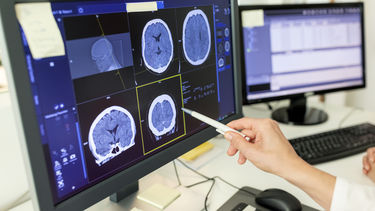- The UK National Institute of Health and Care Excellence (NICE) approves two AI tools for aiding stroke diagnosis
- Sheffield researchers Professors Li Su and Nigel Hoggard and other Specialist committee members in NICE have endorsed the two software be used in the NHS
- These AI-driven solutions promise to expedite stroke diagnosis by quickly analysing CT scan images for brain abnormalities, facilitating prompt treatment decisions critical for optimal patient outcomes.
- The approval emphasises a combined approach where AI tools are used alongside traditional clinical review methods to enhance diagnostic accuracy and streamline decision-making processes.
- With over 100,000 stroke cases in the UK annually, the introduction of AI-powered diagnosis tools marks a significant advancement in modern healthcare, promising to positively impact the lives of the numerous individuals affected by strokes.
Two cutting-edge artificial intelligence tools used to assist the diagnosis of strokes have been approved by the National Institute for Health and Care Excellence (NICE). The team of national experts, which includes researchers from the Neuroscience Institute at the University of Sheffield, have given the green light to AI-derived software solutions e-Stroke and RapidAI. These technologies are poised to transform the landscape of stroke diagnosis and treatment in the National Health Service (NHS).
Stroke, a leading cause of disability and mortality worldwide, requires swift intervention for optimal outcomes. CT brain scans play a pivotal role in diagnosing strokes, particularly ischemic strokes caused by blood clots. However, the traditional review process can be time-consuming, delaying critical treatment decisions.
The emergence of AI-driven software holds the potential to streamline this procedure by quickly analysing CT scan images for brain abnormalities. These sophisticated AI algorithms meticulously scrutinise the fine details within the scans, pinpointing subtle indicators suggestive of stroke, including ischemic lesions and intracranial haemorrhages. By rapidly identifying these abnormalities, the software accelerates the review process, allowing healthcare professionals to promptly initiate appropriate treatment measures.
The accelerated review not only expedites treatment initiation but also allows the transfer of images to various stroke centres. This functionality fosters collaborative decision-making among healthcare professionals, ensuring that patients receive optimal care regardless of geographical constraints.
Stroke patients face multifaceted challenges post-event, including physical disability, cognitive impairment, language difficulties, mental health issues, and emotional instability. Returning to work after a stroke is often arduous, with approximately 50 per cent of working-age patients never returning to employment.
Under the NICE approval, healthcare professionals will use these AI tools alongside traditional clinical review methods. This combined approach aims to enhance diagnostic accuracy and streamline decision-making processes, ultimately improving patient outcomes.
Nigel Hoggard, Professor of Neuroradiology and member of the Neuroscience Institute at the University of Sheffield commented: “AI technologies will revolutionise patient care in many ways, with imaging a part of the vanguard but it is important that their introduction into clinical use is done with evidence that they work and are safe, like we would expect for new medicines. This guidance is an important step in establishing a framework for how the NHS takes up AI technology into clinical care.
While e-Stroke and RapidAI have received the green light for NHS use, further research is required for ten other AI-derived software tools. These tools, including Accipio and Aidoc, await additional evidence to confirm their clinical efficacy and cost-effectiveness.
The recommendations put forth by NICE underscore the importance of cautious implementation. Healthcare centres utilising AI-derived software must adhere to existing reporting protocols and ensure remote review capabilities for collaborative decision-making among stroke centres.
With over 100,000 stroke cases in the UK annually, the introduction of AI-powered diagnosis tools marks a significant advancement in modern healthcare. As these technologies continue to evolve and garner clinical evidence, they hold immense promise in reshaping stroke care paradigms, ultimately enhancing the quality of life for stroke survivors.
Professor Li Su, Head of AI and Computational Neuroscience Laboratory of Cambridge University commented: "Although it is a small step toward a full scale application of AI technology in the NHS, it sends a strong and clear message from one of the world’s most important and respected assessors after years of careful scrutiny that AI is starting to revolutionise how patients will be seen in the healthcare systems and how clinicians will work alongside. Clearly, the UK is playing a critical role in regulating AI technology in life and mission critical sectors such as healthcare."



